英国政体总介绍(中英文)
- 格式:doc
- 大小:43.50 KB
- 文档页数:5
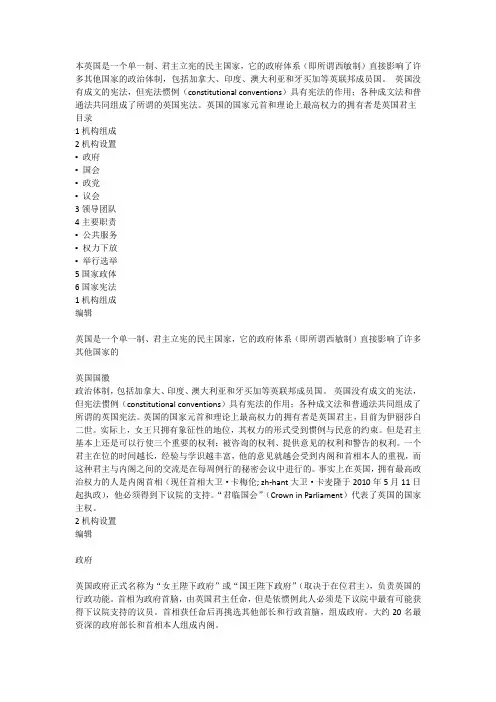
本英国是一个单一制、君主立宪的民主国家,它的政府体系(即所谓西敏制)直接影响了许多其他国家的政治体制,包括加拿大、印度、澳大利亚和牙买加等英联邦成员国。
英国没有成文的宪法,但宪法惯例(constitutional conventions)具有宪法的作用;各种成文法和普通法共同组成了所谓的英国宪法。
英国的国家元首和理论上最高权力的拥有者是英国君主目录1机构组成2机构设置▪政府▪国会▪政党▪议会3领导团队4主要职责▪公共服务▪权力下放▪举行选举5国家政体6国家宪法1机构组成编辑英国是一个单一制、君主立宪的民主国家,它的政府体系(即所谓西敏制)直接影响了许多其他国家的英国国徽政治体制,包括加拿大、印度、澳大利亚和牙买加等英联邦成员国。
英国没有成文的宪法,但宪法惯例(constitutional conventions)具有宪法的作用;各种成文法和普通法共同组成了所谓的英国宪法。
英国的国家元首和理论上最高权力的拥有者是英国君主,目前为伊丽莎白二世。
实际上,女王只拥有象征性的地位,其权力的形式受到惯例与民意的约束。
但是君主基本上还是可以行使三个重要的权利:被咨询的权利、提供意见的权利和警告的权利。
一个君主在位的时间越长,经验与学识越丰富,他的意见就越会受到内阁和首相本人的重视,而这种君主与内阁之间的交流是在每周例行的秘密会议中进行的。
事实上在英国,拥有最高政治权力的人是内阁首相(现任首相大卫·卡梅伦; zh-hant大卫·卡麦隆于2010年5月11日起执政),他必须得到下议院的支持。
“君临国会”(Crown in Parliament)代表了英国的国家主权。
2机构设置编辑政府英国政府正式名称为“女王陛下政府”或“国王陛下政府”(取决于在位君主),负责英国的行政功能。
首相为政府首脑,由英国君主任命,但是依惯例此人必须是下议院中最有可能获得下议院支持的议员。
首相获任命后再挑选其他部长和行政首脑,组成政府。
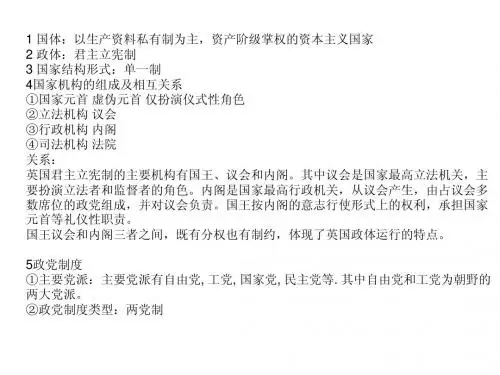
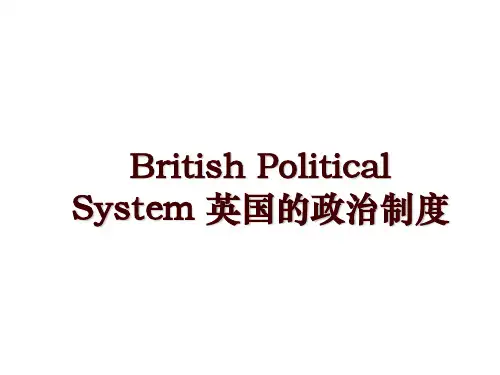

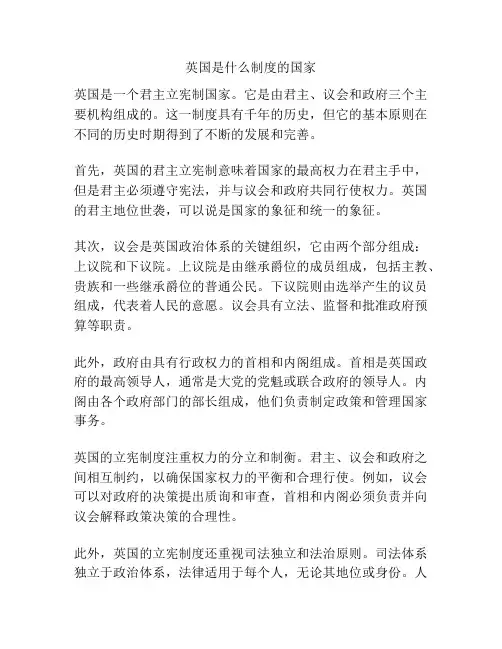
英国是什么制度的国家
英国是一个君主立宪制国家。
它是由君主、议会和政府三个主要机构组成的。
这一制度具有千年的历史,但它的基本原则在不同的历史时期得到了不断的发展和完善。
首先,英国的君主立宪制意味着国家的最高权力在君主手中,但是君主必须遵守宪法,并与议会和政府共同行使权力。
英国的君主地位世袭,可以说是国家的象征和统一的象征。
其次,议会是英国政治体系的关键组织,它由两个部分组成:上议院和下议院。
上议院是由继承爵位的成员组成,包括主教、贵族和一些继承爵位的普通公民。
下议院则由选举产生的议员组成,代表着人民的意愿。
议会具有立法、监督和批准政府预算等职责。
此外,政府由具有行政权力的首相和内阁组成。
首相是英国政府的最高领导人,通常是大党的党魁或联合政府的领导人。
内阁由各个政府部门的部长组成,他们负责制定政策和管理国家事务。
英国的立宪制度注重权力的分立和制衡。
君主、议会和政府之间相互制约,以确保国家权力的平衡和合理行使。
例如,议会可以对政府的决策提出质询和审查,首相和内阁必须负责并向议会解释政策决策的合理性。
此外,英国的立宪制度还重视司法独立和法治原则。
司法体系独立于政治体系,法律适用于每个人,无论其地位或身份。
人
们有权利通过法律途径维护自己的权益,并通过司法程序获得公正和公平的待遇。
总的来说,英国是一个君主立宪制国家,其中君主、议会和政府是其核心机构。
这一制度的特点是权力的分立和制衡、法治原则以及重视司法独立。
通过这种制度,英国保障了公民的权利和自由,并实现了政府的合法权力和行使。
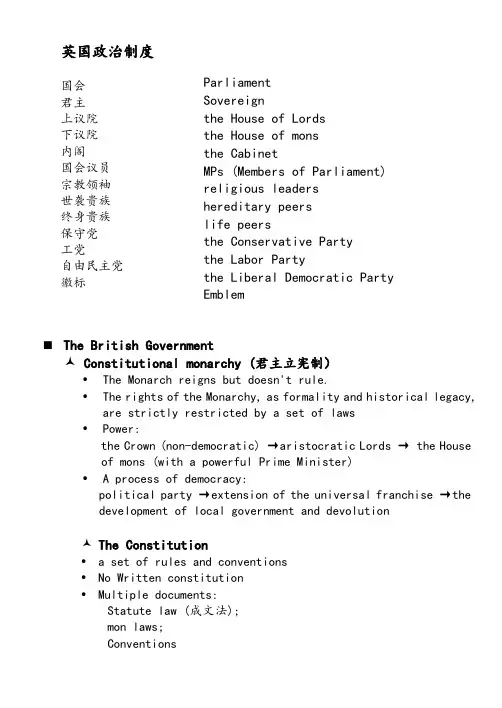
英国政治制度国会君主上议院下议院内阁国会议员宗教领袖世袭贵族终身贵族保守党工党自由民主党徽标ParliamentSovereignthe House of Lordsthe House of monsthe CabinetMPs (Members of Parliament) religious leadershereditary peerslife peersthe Conservative Partythe Labor Partythe Liberal Democratic Party Emblem⏹The British GovernmentConstitutional monarchy (君主立宪制)•The Monarch reigns but doesn't rule.•The rights of the Monarchy, as formality and historical legacy, are strictly restricted by a set of laws•Power:the Crown (non-democratic) →aristocratic Lords → the House of mons (with a powerful Prime Minister)• A process of democracy:political party →extension of the universal franchise →thedevelopment of local government and devolutionThe Constitution• a set of rules and conventions•No Written constitution•Multiple documents:Statute law (成文法);mon laws;ConventionsAncient documentsEuropean Union lawThe European Convention on Human Rights•Characteristics:Constitutional MonarchyParliamentary sovereignty (parliamentary authority unlimited)Representative democracyThe rule of law (people are subject to law, not to the will of governorsThe MonarchyThe King/Queen (ceremonial duties; signing papers) •Legislative:Summon, or dissolve ParliamentGive Royal Assent to bills•JudicialPardon赦免Personal Immunity豁免 (not the Crown)•ExecutiveConfer peerages and knighthoodsAppoint important government positions (government, military, Church) on the advice of the PM•Foreign affairsListens to PM and others’ reports•Cultural: national unity, morality and continuity of history Symbolic functions: “Britishness” of BritainCeremoniesParliament•The supreme legislative body•Three parts: the Crown, the House of Lords, the House of mons •FunctionsLaw-making (create, abolish, amend)Vote the taxationDetermine revenue and expenditure of governmentExamine government policies and administrationDebate major political issues of the day•Each parliament fives years (one session a year )(October or November)•Prime Minister’s Questions (Every Wednesday) (首相质询)•the State Opening of Parliament (议会开幕)The “Queen’s Speech” by the Government to ParliemantHouse of Lords (the Upper House)•Lords Spiritual (神职贵族):religious leaders (archbishop 大主教 and bishop 主教)•Lords Temporal (世俗贵族):hereditary peers and life peers•Law Lords•Nobel titles: duke (公), marquis(侯), earl/count(伯), viscount(子), baron(男)•Lord Chancellor (the most important official in the legal system of England and Wales. He is also the speaker of the Houseof Lords and an important member of the UK government )大法官,上议院议长•Power much reduced:a place of discussion and debatedelay the passage of bills approved by the mons up to a yearthe highest court of appealHouse of mons (the Lower House)•650 seats (England 523, Scotland 72, Wales 38, Northern Ireland 17)•MPs: elected by people of their constituencies ( 选区) in a general election (大选)•Prime Minister (leader of the party with the majority of seats) and the Cabinet•The Leader of the Opposition (the head of the largest defeated party) and the Shadow Cabinet•The government (Party) and the Opposition (Party)What do MPs do•Questions time (government ministers)•From a motion to a bill to an Act (3 readings)on a topic, proposal or motion);from motion to a bill (first reading),to amended and improved version of the bill (2nd reading)Improve the wordingThird readingGoes to Upper HouseGoes to MonarchAn act of Parliament (law)Government•Unitary government (单一制)Three tiers of governments–Central government(Local government)–County government (shires)–District government (cities, boroughs自治市, towns) Central Government•His (or Her) Majesty’s Government•Prime Minister: tremendous powerpresiding over the CabinetAllocating functions among ministersmeeting with the QueenRepresenting the UK at major international events •Ministers•Cabinet:the major decision-making body; 20 Ministers•Collective responsibility (集体负责制)•Civil servants (politically neutral)(500,000) (cannot be candidates for Parliament or support any party) •Whitehall and No. 10 Downing StreetLocal Government•Counties councils (53)•District councils (369)•Locally elected but controlled by laws and policies established by the central governmentDevolution责权下放•Since the late 1990s•The powers of the central government over local affairs↓devolve tothe Scottish and Welsh local legislatures• A Scottish parliament (129 Ms) (1997)• A Wales assembly (60 Ms) (1997)•Northern Ireland assembly (108 Ms) (1998)Political parties• 1. The Liberal Democratic Party (middle)—(Whigs辉格党 1679)—the Liberal Party 1815—the Liberal Party+the SocialDemocratic Party=the Liberal Democratic Party 1988 • 2. The Conservative Party (right)--1688, Tories→the Conservative Party 1815-- supports private enterprise and minimal state regulation-- accepts the mixed economy (private ownership ofbusinesses with some government control.-- believe in a governing class with a natural right andspecial privileges• 3. The Labor party (Left, middle and lower middle classes)-- 1900, unionists, liberals, socialists--believes in socialism (class cooperation) to promote munal growth--demands economic equality--supports nationalization of big enterprises-- believes in the supervision of industry by the government/ distribution of wealth/ equal opportunity foreveryoneEmblem and Colour:•the Conservatives: a blue torch•Labour: a red rose•the Liberal Democrats: a yellow bird.A two-party system of government (since 1945)•Conservative Party:supporter:from the richer sections of societylandowners and business people.People living in the south of England and rural areas 1951-64; 1970-74; 1979-97; May 11, 2010 up to now(David Cameron )(Theresa May13/7/2016)•Labour:Supporters:working class peoplemiddle class people who believe in socialist ideals.People who live in the north of England and in urban areas 1945-51; 1964-70; 1974-79; 1997-2010(Tony Blair 1997-2007, Gordon Brown)Elections•650 constituencies (2010)•One MP each constituency•British citizen, citizens of other monwealth countries and the Republic of Ireland living in UK; 18 or over•Candidate of the party; independent candidate•Ballot (秘密投票)•The simple majority system (vs absolute majority)简单多数原则•Hung Parliament 悬浮议会 1974/2010(no one party has an overall majority) (a minority or coalition government联合政府)•PMs after World War II(see photos from left to right, top to bottom)Tony BlairJohn MajorMargaret ThatcherJames CallaghanEdward HeathHarold WilsonSir Alec Douglas-HomeHarold MacmillanSir Anthony EdenClement AttleeSir Winston ChurchillNeville ChamberlainJudiciary System of UKWords and Expressionsmon law 普通法,习惯法,判例法Precedent 先例Statute law 成文法Criminal law 刑法Civil law 民法Criminal court 刑事法院Civil court 民事法院The Crown Court 巡回刑事法庭The County Court 郡法院The High Court 高等法院Tribunal 特别法庭Magistrates’ court 执事法院Magistrate 执事官,治安官Offence (具体的)罪行Summary offences 简易判决罪Indictable-only offences 可起诉的罪行The suspect 犯罪嫌疑人The defendant/accused/offender 被告The plaintiff/accuser/原告Charge 指控Convict 定罪Prosecute 公诉Appeal 上诉Appeal court 上诉法庭The Crown Prosecution Service (the CPS) 皇家公诉机关Jury 陪审团 juror 陪审员Verdict 判决Sentence 判刑Acquit 宣告无罪Plaint 控诉Solicitor 小律师,事务律师,初级律师,诉讼律师,沙律师Barrister 大律师,辩护律师,高级律师,出庭律师,巴律师Plead 辩护Legal redress 法律救济The Appellate mittee of the House of Lords 上诉委员会The Lord Chancellor 大法官The adversarial system 对抗制Parliament⏹In the United Kingdom, the institution responsible for makinglaws, discussing major issues affecting the country and raising taxes is called________. The three parts of Parliament, the ______ (i.e. king or queen), the House of ______ and the House of_______, meet together only on special occasions. Although the agreement of all three is required for laws to be passed, that of the king or queen is now given without_______.⏹Although the king or queen remains ______ of the kingdom, theresponsibility of the sovereign in policy-making andadministration has been gradually ______ over the past 3-4centuries and government of the country is now in the hands ofa ______, presided over by a ___________. Since the 19th century,the Government has been the political _______with the mostmembers in the House of ______, and the leader of that party has been the ___________.The Judicial System•Separate Legal Systems:England and WalesScotland and Northern Ireland•The supreme executive body of the law:The House of LordsThe Lord ChancellorThe Department for Constitutional Affairs and the Home Office (内政部)No Ministry of Justice (司法部)The Rule of Law•Everyone is bound by the law•All persons are equal before the law•The officials and institutions of the state↓maintainLaw and order•Legal redress for everyone with plaints•The law and legal processes and personnel: independent from political interference•Sources of Lawmon Law System:•The principle of “precedence” (先例):The court will follow the precedents in previous legal cases.•There should be as much certainty in the law as possible. •The creation of new precedents: the House of Lords mon Law•Statute Law: formal written laws passed by the Parliament •European Union Law: since 1973. economic and social matters. (EU law over British domestic law)The Court System•Criminal law: the rules for citizens and acts punishable by the state (theft, murder)•Civil law: the relationships and transactions between private parties, individuals, organizations, or panies (disputes such as pensation for loss or damage)•Administrative law: a special sort of civil law concerning theinteractions of citizens with the state➢Criminal Courtsmagistrates’ Courts →the Crown CourtMinor criminal offences Serous offencessummary offences indictable-only offences(theft, vandalism ) ( rape, murder)magistrates a judge and a jury of 12 (JPs Justices of the Peace)→the Court of Appeals for the Criminal Division →the House of Lords➢Civil Courts:County Courts→High Court90% civil cases more plicated civil cases1 judge, no jury 1-3 judges, no jury→the Court of Appeals for the Civil Division → The House of LordsIn Scotland⏹Criminal Courts:District Court → Sheriff’s Courtslay Justices of the Peace the Sheriff or with a jury of 15→ the Court of Justiciary⏹Civil Court:Sheriff’s Courts → The higher Court of Session → the House of LordsThe House of Lords:The Appellate mittee of the House of Lords:appeals from the courts in England, Wales and Northern Ireland, and in civil cases from ScotlandOther Courts:Tribunals(特别法庭): informal and cheap (disputes between private citizens or/and public authorities) e.g. sex discrimination; unfair dismissal from work, etc.Judicial ProceedingsPut six activities into the most logical order:Prosecute 公诉convict 定罪Sentence 判刑mit 犯罪arrest 逮捕charge 指控The Legal Process⏹ArrestA person may be arrested and held for questioning at a policestation on suspicion of mitting an offence for a maximum of 24 hours without charge, unless a senior police officer thinks more time is needed in the investigation of a serious offence.The accused normally has a right to be represented by asolicitor.⏹ChargeWhen the police are satisfied they have enough evidence, the suspect is charged with the offence. For serious offences, the suspect will be held on remand in prison before trial. For less serious offences, the suspect will be allowed home on bail. For minor offences, the accused may be released with a policecaution.⏹CPSThe Crown Prosecution Service was established in 1986 to ensure uniformity over decisions to prosecute. Roughly 2,000solicitors and barristers operate the CPS and it is theirdecision whether the police have enough evidence to have abetter than even chance of securing a conviction.⏹Magistrates CourtAll cases begin in a magistrates court, and most of them are tried here. However, magistrates are limited in the sentences they can hand down (maximum: 6 months), and more seriousoffences are sent up to crown court. Defendants may also choose to have trial by jury; these cases are also referred to Crown Court.⏹Crown CourtThis is above a magistrates court and is presided over by the judge. His or her job is to direct the twelve members of thejury so they understand the elements that make up the offence.After hearing all the evidence, it is then up to the jury to decide whether the defendant is guilty. The judge then hands down the sentence.The Adversarial System• A lawyer represents the prosecution and the other represents the accused•Both sides call for witnesses in support of their case in order to establish the defendant’s innocence or guilt • A person is innocent until proven guilty•No truth, only evidence before the judge and the juryLay people – Basic principle of involvement of lay people as magistrates or as jurors⏹MagistratesLay people play a major part in the administration of justice through the 28,000 lay magistrates. People who are respected and responsible members of their local munity are selected to serve as magistrates, known in the past as Justices of the Peace, in county courts within the area in which they live. They are not paid for the work and they are not professionally trained in the legal system but they do undergo some part-time training.⏹The JuryThis is the other way that the public is involved in the process of justice and all criminal trials in the Crown Courts and the Old Bailey (High Court) are held before a judge and jury.The jury•All criminal trials in the Crown Courts and the High Court are held before a judge and jury• A group of ordinary citizens (12, 15 in Scotland): drawn froma cross-section of the public and selected at random•Decide whether an accused person is guilty or innocent•Cannot ask questions in court; to listen impartially to the evidence from all sides• A unanimous agreement of guilty or not guilty.•Very rare in civil casesSolicitor and Barrister•Solicitor:The general legal work:paperworkrepresenting the client in certain civil proceedings •Barrister:Have the right to plead cases in court:Give specialized legal adviceAct as advocates in the courtsJudges•Basic principle of judicial independence•The Lord Chancellor: the head of judiciary (appointed by the Prime Minister), appointing magistrates•Judges appointed by the Queen on the advice of the Prime Minister.•Not subject to ministerial direction or control.•Not allowed to take part in politics formally•Irremovable once appointed•Very high salariesMajor Crimes•(attempted) Murder (UK)/Homicide (US)故意杀人•Manslaughter过失杀人•(attempted) Rape强奸•Theft盗窃•Burglary入室行窃•Armed Robbery持械抢劫•Arson纵火•Blackmail勒索•Kidnapping绑架•Hijacking劫持•Criminal Damage损害罪•Cruelty to children/ Children Abuse虐待儿童•Handling Stolen Property销赃罪•Shoplifting入店行窃•Drunken Driving醉酒驾车•Fraud诈骗•Forgery伪造•Drug Trafficking贩毒Some Important Punishments in the English Speaking Countries •Imprisonment 监禁Usually fixed term e.g. 6 years---‘life’ for murder but this is often as 8 years ‘with good behaviour’.•Probation假释The convicted person is not in jail but has to report to a police station every week and has a probation officer who monitors his/her behaviour.•Fine罚款According to different degree of the offence there will be different sums of money to be paid as a punishment. Fines imposed in previous cases are often made examples to provide standards for future cases.•Suspended Sentence缓刑The person is sentenced e.g. to 2 years imprisonment but because of some mitigating circumstances e.g. they mitted the crime under provocation---there is a period of time e.g. 5 years during which if they are convicted of another crime, the original sentence will also e into force and be added to the new sentence.•munity Service社区服务For less serious crimes---often involving young people (juvenile delinquents)---they are sentenced to a period e.g. 1 year during which they must spend a certain number of hours per week working in the munity e.g. decorating old people’s homes, coaching underprivileged children in sports.Maximum prison sentences for serious crimesOffence Max. PenaltyMurder Life imprisonment Rape 7 years Theft 3 years Burglary 3 years Blackmail 5 yearsArson 5 years –Criminal damage to property 2 years –Causing death by dangerous driving 5 years Armed robbery 5 yearsMost English-speaking nations do not have the death penalty though someUSA states do --- and use it quite regularly。
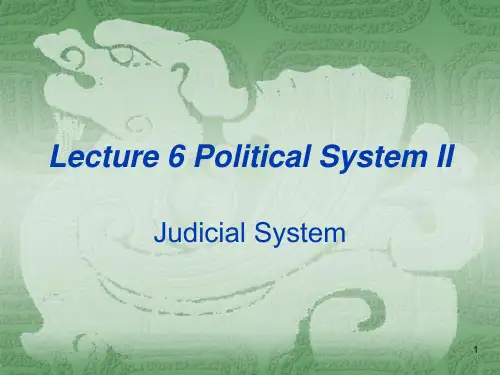
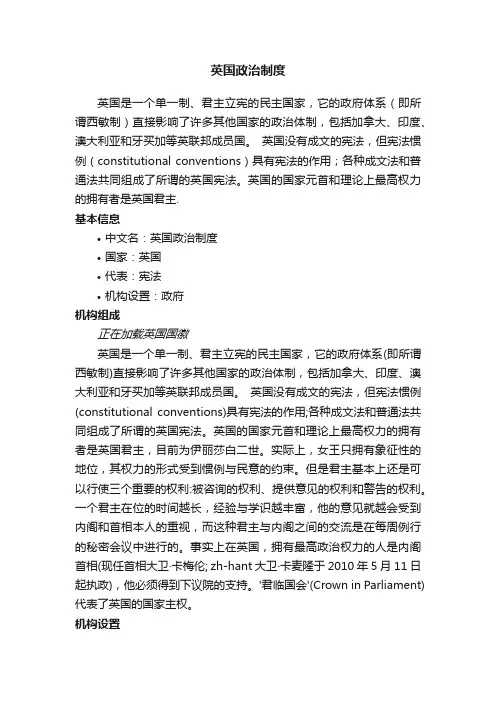
英国政治制度英国是一个单一制、君主立宪的民主国家,它的政府体系(即所谓西敏制)直接影响了许多其他国家的政治体制,包括加拿大、印度、澳大利亚和牙买加等英联邦成员国。
英国没有成文的宪法,但宪法惯例(constitutional conventions)具有宪法的作用;各种成文法和普通法共同组成了所谓的英国宪法。
英国的国家元首和理论上最高权力的拥有者是英国君主.基本信息•中文名:英国政治制度•国家:英国•代表:宪法•机构设置:政府机构组成正在加载英国国徽英国是一个单一制、君主立宪的民主国家,它的政府体系(即所谓西敏制)直接影响了许多其他国家的政治体制,包括加拿大、印度、澳大利亚和牙买加等英联邦成员国。
英国没有成文的宪法,但宪法惯例(constitutional conventions)具有宪法的作用;各种成文法和普通法共同组成了所谓的英国宪法。
英国的国家元首和理论上最高权力的拥有者是英国君主,目前为伊丽莎白二世。
实际上,女王只拥有象征性的地位,其权力的形式受到惯例与民意的约束。
但是君主基本上还是可以行使三个重要的权利:被咨询的权利、提供意见的权利和警告的权利。
一个君主在位的时间越长,经验与学识越丰富,他的意见就越会受到内阁和首相本人的重视,而这种君主与内阁之间的交流是在每周例行的秘密会议中进行的。
事实上在英国,拥有最高政治权力的人是内阁首相(现任首相大卫·卡梅伦; zh-hant大卫·卡麦隆于2010年5月11日起执政),他必须得到下议院的支持。
'君临国会'(Crown in Parliament)代表了英国的国家主权。
机构设置政府英国政府正式名称为'女王陛下政府'或'国王陛下政府'(取决于在位君主),负责英国的行政功能。
首相为政府首脑,由英国君主任命,但是依惯例此人必须是下议院中最有可能获得下议院支持的议员。
首相获任命后再挑选其他部长和行政首脑,组成政府。
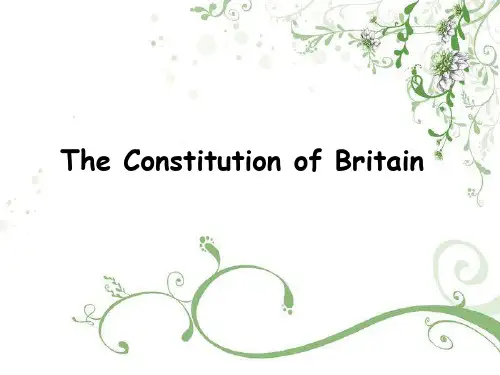
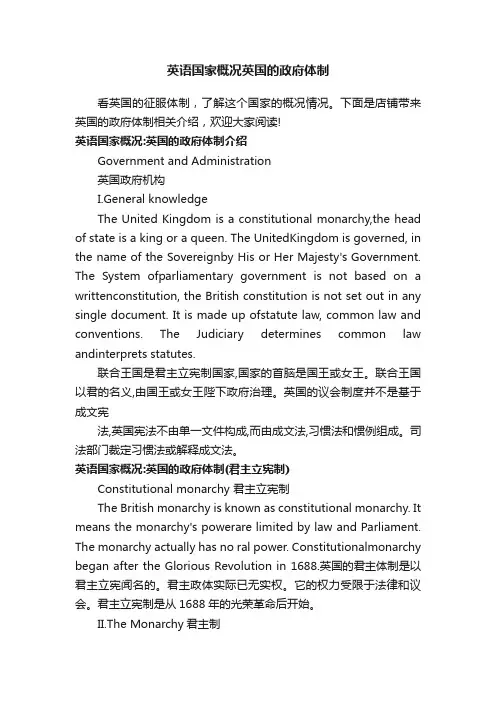
英语国家概况英国的政府体制看英国的征服体制,了解这个国家的概况情况。
下面是店铺带来英国的政府体制相关介绍,欢迎大家阅读!英语国家概况:英国的政府体制介绍Government and Administration英国政府机构I.General knowledgeThe United Kingdom is a constitutional monarchy,the head of state is a king or a queen. The UnitedKingdom is governed, in the name of the Sovereignby His or Her Majesty's Government. The System ofparliamentary government is not based on a writtenconstitution, the British constitution is not set out in any single document. It is made up ofstatute law, common law and conventions. The Judiciary determines common law andinterprets statutes.联合王国是君主立宪制国家,国家的首脑是国王或女王。
联合王国以君的名义,由国王或女王陛下政府治理。
英国的议会制度并不是基于成文宪法,英国宪法不由单一文件构成,而由成文法,习惯法和惯例组成。
司法部门裁定习惯法或解释成文法。
英语国家概况:英国的政府体制(君主立宪制)Constitutional monarchy 君主立宪制The British monarchy is known as constitutional monarchy. It means the monarchy's powerare limited by law and Parliament. The monarchy actually has no ral power. Constitutionalmonarchy began after the Glorious Revolution in 1688.英国的君主体制是以君主立宪闻名的。

一、英国政治体制的模式及特点英国的政治制度是典型的君主立宪制,其主要特点是“议会至上”、以内阁为权力核心、君主虚位、政党组织严密。
首先,英国实行议会民主制,体现“议会至上”的原则。
议会至上,即立法权在三权中居于核心地位,行政和司法机关都是立法机关的一个部分,行政权和司法权实际是立法权的派生,三者互有重叠。
其次,实行内阁制,作为“议会至上”原则在行政权与立法权关系上的制度体现。
即国家的权力体系以内阁为核心,内阁拥有国家的最高行政权力。
再次,英王更多的是一种荣誉性职位,并无真正的实权。
最后,英国政党的组织体系相对比较严密。
可见,英国政治制度最大的特点是“议会至上”,司法权和立法权都出于立法权,民主政治的实质部分居于虚位君主之下。
这种政治制度的优点是,无论是体制形成还是实际运作都相对民主、公正,更有利于决策的科学和周全。
但缺点是,体制或制度容易模式化,导致官僚主义,影响执政效率。
二、美国政治体制的模式及特点美国的政治体制是一个总统制的国家,在其早期的权力构架中,并没有政党的因素,只是在后来政治角逐中,政党不断在其中发挥越来越重要的作用。
其主要特点是:1、总统候选人由政党推荐产生,总统在全国由全体选民直接投票、间接选举产生,当选总统并不一定是得到绝对选票多者,而是为获得选举人票更多者。
总统还是行政首脑,直接控制着行政机构,并且还是三军总司令。
2、美国的政党体制相当松散,政党存在的意义更多的是作为各类选举的工具,选举之后,政党作为一种组织体系作用相当微弱,所以它是一种典型的“选举党”。
美国是一个典型的两党制国家,但它不同于西欧国家的两党制,它不是以意识形态划分的,而是按照区域和利益集团来划分,两党从本质上讲都是代表不同资产阶级利益的政党。
3、美国的国会即众议院、参议院议员一般由政党推荐参选,由全民投票直接选举产生,拥有立法权。
4、美国的总统尽管名义上是所在党的领袖,但当选后更多的是以“全民总统”的面目出现。
英国指南.英国的内政.英国的政体(1)君主政制女王拥有什么权力?王国政府代表英王(即宪法赋予其统治王国权力的人)及政府,也是最高行政机构的象征。
英女王拥有王国政府的统治权,但行使有关权力的,一般都是向国会负责的部长级官员,因此英国实际上是由英国政府代替女王管治的。
然而,大部分重要的政府议案仍须得到女王同意方可获得通过。
国会女王有权召开、解散或下令国会休会。
新一年度国会在召开第一次会议前,女王均会发表一篇由政府官员撰写的演辞,内容主要简述政府新一年的工作大纲。
每项议案均须得到女王在国会两院宣布正式批准方能成为法律。
女王在部长的建议下有权特赦囚犯或宣布减刑。
根据法律规定,女王个人是不会犯法的——因为她获民事及刑事起诉的豁免权,法庭也不能起诉她。
然而,其他王室成员却不能享有该项豁免权。
勋衔及委任女王有权册封贵族、颁授爵位及其他勋衔。
受勋人士名单通常由首相提名,但某些勋衔则由女王自己决定。
许多重要的国家职位均由女王委任,人选则由首相或有关内阁大臣提名。
外交政策各国派驻伦敦的外交人员均须得到女王的同意,她有权缔结条约、发动战争或议和、确认海外国家及政府、吞并及割让领土。
枢密院女王负责主持枢密院的会议。
按君主特权所订立的枢密令,以及其他法令均是由枢密院通过的。
君主特权包括组织行政机关,而政府的权力则受制于宪法习惯(这些规则本身并非法律,但对政府的运作却异常重要)。
所有涉及君主特权的行为,均须由有关部长负责执行,他们须向国会负责,并就各项政策接受国会议员的质询。
国会有权撤消或限制有关特权的行使。
除了听取各项报告外,女王也可随时就国民生活情况向其官员发表意见。
为什么英女王有两个生日呢?女王的出生日期是在4月21日。
但传统以来,英国人都习惯于夏天庆祝君王的寿辰。
由1805年起,英国人开始以举行军旗礼来庆祝君王的官方寿辰,日期通常是定于6月的第二个周末。
这个仪式的本来目的是让士兵熟识其所属兵团的旗帜式样,以便日后行军打仗时易于识别。
英国政治制度
英国政治制度可以追溯到1215年的《大宪章》。
它是一个立
宪君主制度,包括君主、议会和内阁三个主要机构。
首先,君主是英国政治制度的核心。
英国君主的地位相对较低,主要是象征性的,而不是实际的统治者。
英国君主的权力是有限的,大部分权力已经转移到议会和内阁这两个机构上。
君主的职责包括批准法律、任命首相和国会议员等。
其次,议会是英国政治制度的重要组成部分。
议会分为上议院和下议院两个部分。
上议院是继承自中世纪贵族院,由约800
名身份特权继承的贵族组成。
下议院则是由普通公民选举产生的,代表了人民的利益。
议会的主要职责是制定和审查法律,监督政府行为,以及讨论和决定重要政策。
最后,内阁是英国政治制度中的重要机构。
它由首相和其他部长组成,负责制定政府政策和决策。
内阁成员通常是来自议会中最大党的成员。
内阁的职责包括制定国家预算、处理外交事务、管理经济和社会问题等。
英国政治制度的一个重要特点是权力分散和制衡。
君主、议会和内阁之间相互制约,避免了某一方过度集中权力。
此外,英国政治制度还保护了公民的基本权利和自由,例如言论自由、媒体自由和选择权等。
总的来说,英国政治制度是一个立宪君主制度,君主、议会和内阁是其三个主要机构。
君主有限的权力主要是象征性的。
议
会由上议院和下议院组成,负责制定和审查法律、监督政府和讨论政策。
内阁是负责制定政府政策和决策的机构。
英国政治制度的特点包括权力分散和制衡,以及保护公民基本权利和自由。
英国指南.英国的内政.英国的政体(1)君主政制女王拥有什么权力?王国政府代表英王(即宪法赋予其统治王国权力的人)及政府,也是最高行政机构的象征。
英女王拥有王国政府的统治权,但行使有关权力的,一般都是向国会负责的部长级官员,因此英国实际上是由英国政府代替女王管治的。
然而,大部分重要的政府议案仍须得到女王同意方可获得通过。
国会女王有权召开、解散或下令国会休会。
新一年度国会在召开第一次会议前,女王均会发表一篇由政府官员撰写的演辞,内容主要简述政府新一年的工作大纲。
每项议案均须得到女王在国会两院宣布正式批准方能成为法律。
女王在部长的建议下有权特赦囚犯或宣布减刑。
根据法律规定,女王个人是不会犯法的——因为她获民事及刑事起诉的豁免权,法庭也不能起诉她。
然而,其他王室成员却不能享有该项豁免权。
勋衔及委任女王有权册封贵族、颁授爵位及其他勋衔。
受勋人士名单通常由首相提名,但某些勋衔则由女王自己决定。
许多重要的国家职位均由女王委任,人选则由首相或有关内阁大臣提名。
外交政策各国派驻伦敦的外交人员均须得到女王的同意,她有权缔结条约、发动战争或议和、确认海外国家及政府、吞并及割让领土。
枢密院女王负责主持枢密院的会议。
按君主特权所订立的枢密令,以及其他法令均是由枢密院通过的。
君主特权包括组织行政机关,而政府的权力则受制于宪法习惯(这些规则本身并非法律,但对政府的运作却异常重要)。
所有涉及君主特权的行为,均须由有关部长负责执行,他们须向国会负责,并就各项政策接受国会议员的质询。
国会有权撤消或限制有关特权的行使。
除了听取各项报告外,女王也可随时就国民生活情况向其官员发表意见。
为什么英女王有两个生日呢?女王的出生日期是在4月21日。
但传统以来,英国人都习惯于夏天庆祝君王的寿辰。
由1805年起,英国人开始以举行军旗礼来庆祝君王的官方寿辰,日期通常是定于6月的第二个周末。
这个仪式的本来目的是让士兵熟识其所属兵团的旗帜式样,以便日后行军打仗时易于识别。
五个步兵团,包括近卫步兵第一团、Coldsteam步兵团、苏格兰、爱尔兰及威尔士步兵团,每年按编制负责于仪式上展示其军旗。
仪式开始时,女王会在王室骑兵军官的陪同下骑马离开白金汉宫,沿着林荫大道步往骑兵卫队的阅兵场,检阅五百名卫兵。
军旗礼展示的军旗依照卫兵的官阶高低排列,每队卫兵随着军旗带领,在步兵团的陪同下,分列式步操经过女王面前。
至于女王正式生日当天,并无特别仪式举行,只是各政府大楼会有升国旗及播放国歌,以示庆祝。
王位继承人的排列次序如下:1.威尔斯王储(1948年生)2.威廉王子(1982年生)3.亨利王子(1984年生)4.约克公爵(1960年生)5.比雅丝公主(1988年生)6.尤珍妮公主(1990年生)7.爱德华王子(1964年生)8.安妮公主(1950年生)9.安妮公主之子,彼德。
菲利普斯(1977年生)10.安妮公主之女,莎拉菲利普斯(1981年生)(2)宪法及政府①英国如何选举政府?国会是英国人民的立法机关,由君主、下议院及上议院三部分组成。
他们只在传统仪式如国会开幕时,才会聚首一堂。
虽然如此,任何议案也必须得到三者的同意方可成为法律。
下议院共有659位由选举产生的成员,称为国会议员。
其主要工作是通过国会法案制订法律,并就政治问题进行辩论。
下议院选举是英国民主体制的重要部分。
上议院共有约1,270位非选举产生成员(包括:世袭贵族、终身贵族、以及圣公会两位大主教及24位高级主教)。
其主要立法功能是审查及修改下议院通过的法案。
此外,上议院也担当着终审庭的角色。
对于获得下议院通过的议案,上议院在正常情况下都不得作出否决。
大选通常在国会会期届满(最长五年),或由英王宣布解散国会后举行,至于举行的时间则由首相决定。
英国共分多个选区,每个选区均会选出一位下议院国会议员。
英国的选举制度基本上采取相对多数制,或称“票数领先者当选”的原则。
所有英国公民、在英国居住的英联邦国家公民及爱尔兰共和国公民,只要年满二十一岁或以上,且没有法律限制其投票权的,都可在大选中投票。
不享有投票权的人士包括服刑中的囚犯、本身是上议院成员的贵族、以及那些受精神健康条例限制不可离开医院的病人。
投票以保密方式进行。
投票时,选民只能在选票上投票支持一位候选人,并在该名候选人名字旁的空格划上“X”。
选民在大选中投票属自愿性质。
英国大选的投票率平均约有75%。
所有英国公民、英联邦国家公民及爱尔兰共和国公民,只要是年满十八岁或以上,且合乎资格的,都可竞选国会议员。
不合乎竞选资格人士包括:破产、被判刑超过一年、神职人员、上议会成员以及所有公职人员。
候选人通常获政党提名,在其代表的选区参选,但政党支持并非参选的必要条件。
在大选中赢得最多议席(但不一定是赢得最多票数)的政党领袖,或是得到大部分下议院成员支持的政党领袖,通常会获英王邀请成立新政府。
②权力下放——苏格兰及威尔士英国政府设立苏格兰议会及威尔士议会,目的是让苏格兰及威尔士的人民可于更大程度上决定自己的内部事情。
这两项建议在1997年9月举行的全民投票中,均获得苏格兰及威尔士人民的支持。
苏格兰议会设在爱丁堡市,共有议员129名,其中的73名在各选区以直选产生;56名以比例代表制选举产生;议员于1999年就任,任期为四年。
议会的权力与现时苏格兰事务处各部长所行陡的相同,并可制订法律,以及增加或减少薪俸税最多达3%。
苏格兰仍会继续选出国会议员于下议院中代表其利益。
威尔士议会设于卡迪夫市,将于1999年5月正式成立;共有议员60名。
每四年一次由直选产生。
议会主要是辩论关乎威尔士利益的事项,并负责管理现时威尔士事务处的预算。
威尔士将继续沿用英格兰的法律制度。
③主要政党的名称由来保守党及统一党皆源于十八世纪末的托利党。
该党代表乡绅、商人阶级及官方团体的利益。
当英国于1832年通过了(选举)改革议案后,部分旧托利党的成员便开始组织保守派团体。
18313年1月号的QuarterlyReview首次使用“保守党”来称呼这个致力维持传统价值观及运作模式的政党。
今天,保守党是主要的右翼政党。
现时仍有人以“托利”来形容一些持保守政见的人士。
工党原名为工人代表委员会。
故名思义,该党主要保障工业劳工阶层的利益。
1900年,贸易工会总会与独立工党(成立于1893年)合并而成工党代表委员会,由拉姆齐麦当奴出任第一秘书。
该党其后于1906年正式改名为工党。
自由党是继承历史政党——辉格党于十九世纪中崛起的政党。
“辉格”一词在苏格兰盖尔语中原本解作“骑马贼”。
于十八世纪末,辉格党主要由一群争取选举、议会及慈善事业改革的政客组成。
“辉格”一词至今已不复存在。
1832年后,主要由贵族组成的“辉格党”已有不少中产阶级成员加入。
自由党这名称直至1839年才开始有人使用,而首个自由党政府则于1868年由格莱斯顿领导成立。
1988年,自由党与社会民主党合并成为现时的自由民主党。
④如何选出下议院议长?下议院议长在议会里并无发言权,也不得参与辩论。
该职位由1377年起设立,早期的下议院议长主要职责是代表下议院与王室对话。
现时的下议院议长则只为一个礼仪职位,主要职能是维持辩论的秩序;除了于特别规定情况下,他(她)并没有投票权。
但即使是在该种情况下,他(她)也不能就辩论的议题发表意见,而且当投票时,也只能以职权身份投票。
下议院议长共有三位副手:除了以职权身份在特别情况下准予投票外,三人均无投票权。
下议院议长并非部长或任何政党的成员,但他(她)也是国会议员,并代表其选区及选民的利益。
下议院议长由国会议员以一人一票形式投票选出。
1992年庞碧婷击败前内阁成员布鲁克,当选下议院长一职。
在一般情况下,下议院议长都是在没有国会议员反对下当选的。
在国会中whip一词指的是什么?该词原指在狩猎大会中负责维持比赛规则的人士。
在国会中,该词则解作国会领袖,其职责主要为执行纪律及控制党内国会议员。
政府国会议员领袖则是指所有效忠王室的部长官员。
下议院国会议员领袖的最主要职责是处理下议院有关政府的事宜。
他(她)必须敦促国会能如期通过所有议案或于会期内完成各项既定工作。
两个主要政党的国会议员领袖则以议题或地区分工。
他们负责统筹党内议员的意见,并将之报告党领袖,以及维持各部长与支持他们的后座议员的联系,这是非常重要的工作。
whip一词也指每星期寄往各有关国会议员的一周议事日程表。
各议题会按政党的关注程度,分别在下方划上单线、双线或三线作表示,让党领袖留意。
当有议题是划上三条线的话,党领袖便会通知党内国会议员于辩论当日,务必出席有关会议,参与表决。
The United Kingdom is a constitutional monarchy: Queen Elizabeth II is head of state of the UK as well as of fifteen other Commonwealth countries, putting the UK in a personal union with those other states. The Crown has sovereignty over the Crown Dependencies of the Isle of Man and the Bailiwicks of Jersey and Guernsey, which are not part of the United Kingdom though the UK government manages their foreign affairs and defence and the UK Parliament has the authority to legislate on their behalf.The United Kingdom has an uncodified constitution,[37] as do only two other countries in the world. The Constitution of the United Kingdom thus consists mostly of a collection of disparate written sources, including statutes, judge-made case law, and international treaties. As there is no technical difference between ordinary statutes and "constitutional law," the UK Parliament can perform "constitutional reform" simply by passing Acts of Parliament and thus has the power to change or abolish almost any written or un written element of the constitution. However, no Parliament can pass laws that future Parliaments cannot change.[38]The UK has a parliamentary government based on the Westminster system that has been emulated around the world—a legacy of the British Empire. The Parliament of the United Kingdom that meets in the Palace of Westminster has two houses: an elected House of Commons and an appointed House of Lords, and any Bill passed requires Royal Assent to become law. It is the ultimate legislative authority in the United Kingdom since the devolved parliament in Scotland and devolved assemblies in Northern Ireland, and Wales are not sovereign bodies and could be abolished by the UK parliament despite being established following public approval as expressed in referenda.The Houses of ParliamentThe position of Prime Minister, the UK's head of government, belongs to the Member of Parliament who can obtain the confidence of a majority in the House of Commons, usually the current leader of the largest political party in that chamber. The Prime Minister and Cabinet are formally appointed by the Monarch to form Her Majesty's Government, though the Prime Minister chooses the Cabinet, and by convention HM The Queen respects the Prime Minister's choices.[39]The Cabinet is traditionally drawn from members of the Prime Minister's party in both legislative houses, and mostly from the House of Commons, to which they are responsible. Executive power is exercised by the Prime Minister and Cabinet, all of whom are sworn into Her Majesty's Most Honourable Privy Council, and become Ministers of the Crown. The Rt Hon Gordon Brown MP, leader of the Labour Party, has been Prime Minister, First Lord of the Treasury and Minister for the Civil Service since 27 June 2007.[39]For elections to the House of Commons, the UK is currently divided into 646 constituencies, with 529 in England, 18 in Northern Ireland, 59 in Scotland and 40 in Wales,[40] though this number will rise to 650 at the next General Election. Each constituency elects one Member of Parliament by simple plurality. General Elections are called by the Monarch when the Prime Minister so advises. Though there is no minimum term for a Parliament, the Parliament Act (1911) requires that a new election must be called within five years of the previous general election.The UK's three major political parties are the Labour Party, the Conservative Party, and the Liberal Democrats, who won between them 616 out of the 646 seats available in the House of Commons at the 2005 general election. Most of the remaining seats were won by parties that only contest elections in one part of the UK such as the Scottish National Party (Scotland only), Plaid Cymru (Wales only), and the Democratic Unionist Party, Social Democratic and Labour Party, Ulster Unionist Party, and Sinn Féin (Northern Ireland only, though Sinn Féin also contests elections in Ireland). In accordance with party policy, no elected Sinn Féin Member of Parliament has ever attended the House of Commons to speak in the House on behalf of their constituents as Members of Parliament are required to take an oath of allegiance to the Monarch.[41]For elections to the European Parliament, the UK currently has 72 MEPs, elected in 12 multi-member constituencies.[42] Questions over sovereignty have been brought forward because of the UK's membership of the European Union.[43]。